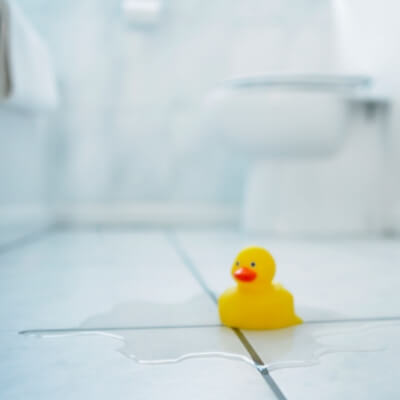5 ways to protect your home from water damage
- Water is a common cause of household damage
- The most likely sources are burst flexible hoses, appliance malfunctions, and blocked drains and gutters
- Preventative maintenance and insurance cover are important, and it’s essential to call a licensed plumber for trickier repairs or where there’s a risk of serious damage
“Preparedness and prevention are key to limiting the potential damage caused by internal water damage,” says Arron Mann, General Manager, Short Tail Claims at QBE.
Water damage can leave your home and its contents at risk of significant loss. Prevention starts with planning and maintenance, so here are five common causes of water damage, along with tips for preventing and dealing with them.

1. Burst flexible hoses
A flexible hose is a plastic tube with a stainless steel braid around it and is usually under the sink in your kitchen or bathroom.
Flexible hoses deteriorate over time and need to be checked and replaced, to prevent them from bursting without notice.
What to do if you have a burst flexible hose
For any uncontrolled leak, including a burst pipe, turn off your water supply and call a licensed plumber. You’ll find the shut-off valve in your water meter box, which is usually near the street.
This can generally be done by hand, while you may need a spanner for older models.
How to prevent a burst flexible hose
Flexible hoses usually burst because they were damaged during installation, have suffered wear and tear, or have had corrosive chemicals such as dishwashing powder stored next to them.
Avoid storing cleaning products nearby and check the hoses are still in good condition at least once every 12 months.
2. Water damage caused by appliances
Water damage caused by home appliances like washing machines and dishwashers is a common insurance claim.
What to do if your appliances are leaking
Turn off the machine and the water running to it. Mop up water and dry carpets if necessary. Don’t use the appliance and call in a professional to repair.
How to prevent a leaking appliance
To prevent water damage, it’s a good idea to check your household appliances for wear and tear regularly.
The cost to replace carpets and other household contents can often be higher than replacing the appliance itself. In fact, damage can run into tens of thousands of dollars in extreme cases.
“Sometimes the difference between no damage and severe damage can be in how quickly a householder responds. Yet many people are unaware that much of this damage – and the stress and cost that comes with it – is often preventable,” states Mann.
3. Blocked drains
In torrential rain, you can experience significant damage from water flowing through blocked drains and into your house.
What to do if your drains are blocked
In this situation, you need to call an emergency plumber, as turning off the water supply won’t help.
How to prevent blocked drains
Blocked drains are usually caused by tree roots, kitchen paper towels, baby wipes, nappies, and sanitary products. Call a professional to deal with root invasion and avoid flushing any items that could be put into the rubbish.
4. Blocked gutters
Blocked gutters or downpipes can lead to an overflow of water into your eaves and inside your home in heavy rain.
What to do if your gutters are blocked
Never attempt to unclog your gutters during a storm or rain event. Wait until the storm passes and the roof is dry before trying to access and clear them.
Instead, keep the water damage to a minimum by regularly mopping up the mess.
How to prevent blocked gutters
Gutter blockages can come from too many leaves to stray tennis balls or other household items. So, it’s good to check your guttering regularly to ensure everything’s clear.
5. Take note of plumbing regulations
In Australia, plumbing can generally only be done by a licensed professional. Here’s more information about plumbing licensing. Rules and certain tasks that can be done by homeowners vary according to state.
Even after undertaking regular maintenance, unforeseen events can happen. That’s when it pays to have home and contents insurance.
Learn about QBE Home Insurance and get a quote.









